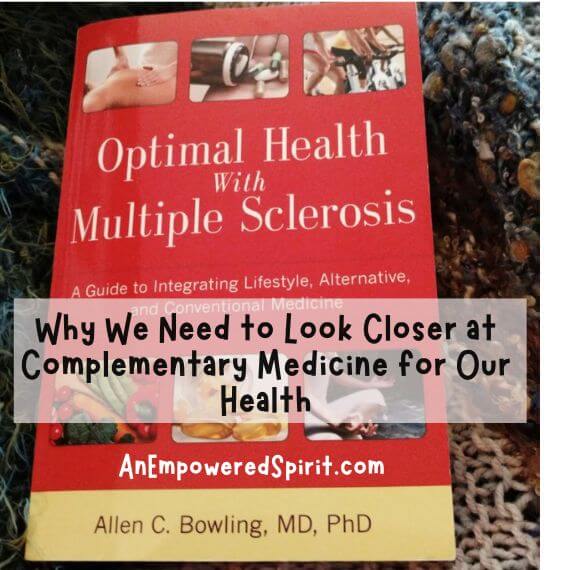
Living with an illness, any illness, prompts you to find ways to feel better. If you have a headache, you take an aspirin. If you have high cholesterol, you take a statin. However, there are sometimes no simple solutions to alleviate your symptoms.
What do you do when you're desperate to step outside the box of conventional medicine to feel better?
One internationally known neurologist and MS specialist guided his patients to think outside the box for years. Dr. Allen Bowling is a leading authority on complementary and alternative medicine (CAM) applied to Multiple Sclerosis.
Dr. Bowling came onto my radar when I searched for more ways to live healthier. The diets I discovered for MS years ago didn't meet my expectations. Roy Swank promoted his extremely low-saturated-fat diet, while John McDougall advocated a low-fat "fad" diet.
They weren’t for me.
I knew I didn’t want to rely solely on Solumedrol whenever I had an exacerbation; it was the only option at the time of my diagnosis. I wondered if diet, exercise, and a holistic health approach combined with traditional medicine would provide a healthier way of life.
Loyal readers know I was an early devotee of Dr. Andrew Weil's advice soon after my diagnosis. Weil focuses on holistic health and integrative medicine. I clung to him at the beginning of my MS journey.
Years later, I came across an article about Dr. Allen Bowling and his groundbreaking work in the field of complementary and alternative medicine (CAM). I needed to find out more.
When I had the chance to attend a symposium at the Consortium of Multiple Sclerosis Centers' annual meeting, Dr. Bowling presented a topic titled "Expanding the MS Toolkit: Integrating Lifestyle Factors and Unconventional Medicine Into MS Clinical Care." I found it fascinating.
Bowling’s book “Optimal Health with Multiple Sclerosis: A Guide to Integrating Lifestyle, Alternative, and Conventional Medicine” synthesizes his decades of significant research, writing, and caring for the MS community.
Now, I use his book as a guide for healthy living.
This book is a dependable reference that can be used repeatedly. It serves as a comprehensive guide for better health for those living with multiple sclerosis (MS) or anyone interested in leading a healthier life.
How did you first become interested in integrative medicine? When did you decide to share your interest with the MS community?
I first became interested in integrative medicine when I entered practice 20 years ago and realized that most of my patients were interested in this type of approach, yet I had received no education or training in this approach.
I began writing and speaking on the topic once I collected a small amount of evidence-based information in this area (a few months of work 20 years ago). I also began to incorporate it into my clinical practice.
What first concept caught your eye to learn more about integrative medicine?
What caught my eye about this approach (and was actually quite shocking!) is that it actually leads to a higher quality of care, but it is not the standard of care. It provides a higher quality of care because it includes conventional medicine, addresses lifestyle factors that may prevent many diseases and may be beneficial for MS and many other conditions, and provides evidence-based information about “alternative” approaches.
Were you influenced by anyone’s work in integrative medicine to help you decide to go in that direction?
Early in my work, few professionals genuinely used an evidence-based approach in this area—most of the available information was excessively negative or positive and did not include much evidence. In the 1990s, I was influenced by the work of Dr Edzard Ernst in the United Kingdom.
My patients generally did not find either of these extreme, non-evidence-based approaches helpful—they wanted the “real deal” information without spin or sugar-coating.
How do you explain integrative medicine to patients and why they’d benefit from incorporating it into their own lives?
I explain to patients that there is evidence that conventional MS medications have benefits for modifying MS disease course and treating MS symptoms. Still, there is also evidence that exercise, diet, emotional health, tobacco use, alcohol, and other medical conditions have essential effects on MS and general health and, therefore, MUST be incorporated into the treatment plan.
In your experience, does any one “type” of MS benefit more from integrative medicine than another?
I think all types of MS may benefit from this approach. In the specific case of progressive MS, for which many feel the treatment options are limited, I would argue that many therapies, primarily integrative, are available and should be used.
What has been the biggest game changer in how patients view integrative medicine?
I think the biggest game changer is that people with MS and professionals are more open to this approach and that more evidence is available to support the safe and effective use of these approaches.
What diet(s) do you suggest for the MS community?
I doubt there will ever be one best diet for MS—I think we may find one diet that’s the worst for MS…the standard American diet. For diet, I recommend:
How much exercise do you recommend to patients?
For exercise, I also think that it is unlikely we will ever find the best program for people with MS. What I recommend is a personalized program that is enjoyable and generally has these features:
Please explain your integrative MS model and the new MS care paradigm.
The new paradigm of care that I discuss is this integrative model applied to MS. I discuss in detail in my recent book, Optimal Health with MS. This approach utilizes conventional medicine as well as unconventional medicine and lifestyle strategies to treat MS but also to treat other medical conditions and maintain whole body health.
This approach has seven steps:
What are your thoughts on medical marijuana for MS patients?
I think marijuana use needs to be thought through carefully for people with MS. As with any drug, one should weigh the risks and benefits of marijuana. Multiple studies in MS show that marijuana products may improve pain and one’s sense of muscle stiffness (spasticity).
Unfortunately, the products used in these studies are unavailable in the US, which leads to a challenge in relating these studies to day-to-day practice with products available in the US. Marijuana may interact with prescription medications and has possible adverse effects, such as addiction, motor vehicle accidents, dizziness, and impaired balance.

If you're interested in learning more about Dr. Bowling, here's a blurb about him from the Yale School of Medicine's website:
When he returned to his native Colorado 20 years ago to treat people with multiple sclerosis, Allen C. Bowling, M.D. ’88, Ph.D. ’88 believed he was well prepared. After earning a medical degree and a doctorate in pharmacology at Yale, he completed his neurology residency at the University of California, San Francisco. He spent three years as a fellow at Harvard.
“I was thinking, ‘Wow! I have such a great toolbox for doing clinical practice at a high level.’ ” Before long, however, Bowling recognized gaps in his knowledge. “There’s so much I don’t know, so much I didn’t get, in more than a decade of training.”
This realization grew out of the nature of multiple sclerosis (MS): this disease of the central nervous system is incurable and unpredictable and causes a constellation of symptoms. Although his patients generally took conventional medications for MS, Bowling discovered that most were interested in how such lifestyle issues as diet and exercise affect the disease. More than half pursued strategies not dreamed of in the medical school curriculum: reflexology, removal of dental fillings, marijuana, magnets, pressurized oxygen, and prayer. However, at that time, there were no reliable sources of MS-specific information in these areas.
“I realized that the quality of MS care could be improved by providing objective information about the safety and efficacy of these lifestyle and unconventional approaches to people with MS and also to health professionals."
